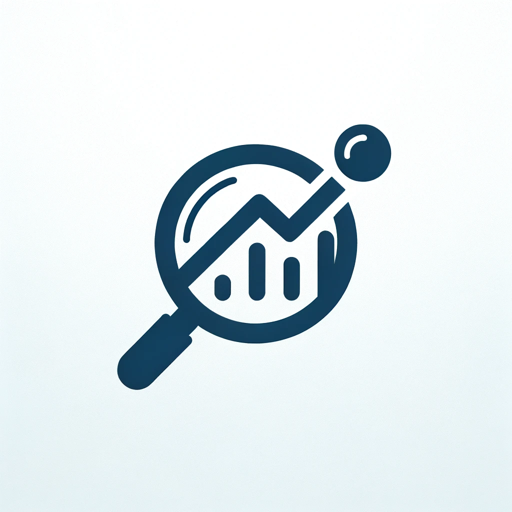Research Analyst-AI tool for research analysis
AI-powered insights for research mastery
Explain the methods used in this research paper.
Summarize the key findings and their significance.
Discuss the evolution of methodologies in this field.
Suggest further reading on these research methods.
Related Tools
Load More
Investment Analyst
Investment analysis assistant using up-to-date data to score companies.

Equity Research Analyst by beatandraise.com
Ask anything about any SEC filing from Edgar.

Market Research and Trends Analyst
Market research expert, offering tailored insights and trends analysis

Market Analyst
Analyzes specific stocks and suggests options strategies.

Equity Analyst
Delivers precise stock analyses with clear price targets and recommendations

Market Analyst
Expert in stocks, ETFs, and comprehensive market analysis.
20.0 / 5 (200 votes)
Introduction to Research Analyst
Research Analyst is designed as a versatile tool focused on providing in-depth analysis, particularly in the fields of research methodology and academic inquiry. Its primary function is to assist users in understanding complex research concepts, offering explanations of terminologies, methodologies, and best practices across multiple disciplines. Additionally, it is designed to foster critical thinking by posing reflective questions and offering real-world examples, thereby enhancing learning and comprehension. By analyzing diverse research contexts, the tool allows users to break down sophisticated ideas and understand how they apply to specific case studies or fields of study. For example, in the context of designing a research study, Research Analyst can guide users through different research paradigms—such as qualitative vs. quantitative methods—explaining when and why each might be appropriate. It can also assist in literature reviews by outlining approaches to finding, analyzing, and summarizing relevant academic sources. Furthermore, it can simulate real-world research problems and assist with hypothetical designs, thereby providing practical applications of abstract concepts.

Main Functions of Research Analyst
Research Methodology Guidance
Example
A doctoral student is unsure whether to use a mixed-methods approach for a study on educational outcomes. Research Analyst explains the advantages and challenges of mixed-methods research, as well as how to structure it effectively.
Scenario
In academic research, particularly at the graduate level, students often struggle with choosing an appropriate methodology. Research Analyst helps by explaining the pros and cons of qualitative, quantitative, and mixed-methods approaches, guiding the student to make an informed decision based on the research goals.
Critical Analysis of Research Papers
Example
A researcher wants to critically evaluate a paper on climate change policy. Research Analyst breaks down the paper's methodology, sampling techniques, data collection, and analysis methods, highlighting potential biases or methodological flaws.
Scenario
In situations where researchers need to conduct peer reviews or simply assess the quality of existing studies, Research Analyst offers detailed insights into research designs, helping users critically engage with published works. It highlights both strengths and limitations, providing a more nuanced understanding of the paper’s contributions.
Teaching and Learning Aid
Example
A professor preparing lecture materials on research ethics uses Research Analyst to explain case studies that illustrate ethical dilemmas, such as informed consent or data privacy violations in real-world studies.
Scenario
In educational contexts, instructors can use Research Analyst as a teaching tool. Whether explaining the foundations of research ethics or discussing the evolution of particular methodologies, it can generate case studies, pose discussion prompts, or provide detailed historical examples, thereby enriching the teaching experience.
Ideal Users of Research Analyst
Graduate Students and Early Career Researchers
Graduate students and early career researchers often require support in understanding the intricacies of research design, methodology, and analysis. Research Analyst is ideal for this group because it simplifies complex concepts and provides detailed explanations on research best practices, helping them design and execute their studies more effectively. Additionally, it offers critical feedback on existing research, aiding in literature reviews and paper writing.
Educators and Academic Instructors
Instructors who teach research methodology, statistics, or field-specific research approaches benefit from Research Analyst’s detailed guidance and ability to generate real-world examples. It can be used to develop teaching materials, provide supplementary content for lectures, or pose questions that encourage critical thinking among students. Its capacity to break down sophisticated concepts into understandable parts makes it an excellent resource for enriching course content.

How to Use Research Analyst
Visit aichatonline.org
Start by visiting aichatonline.org for a free trial without needing to log in or sign up for ChatGPT Plus. This ensures quick and easy access to the tool.
Identify your research needs
Determine whether you're analyzing data, reviewing methodologies, or generating insights. This step helps you tailor your queries and maximize the output from Research Analyst.
Input detailed research queries
Ask specific questions related to your research, from clarifying complex methods to seeking guidance on writing papers. Providing detailed input leads to more comprehensive results.
Review the output and request clarification
Carefully read the response. If needed, ask for more detail, clarification, or refinement to ensure that the answer aligns with your research objective.
Incorporate insights into your work
Use the detailed analysis, methodologies, or research tips provided to enhance your writing, data analysis, or project work. Ensure proper citations where applicable.
Try other advanced and practical GPTs
CELPIP Writing Estimator
AI-Powered CELPIP Writing Evaluation

Prompt Reverso MidJ
AI-powered tool for customized visuals

LogoGPT
AI-Powered Logo Design Made Simple

What is your face shape type?
AI-driven personal style assistant

私と日常の英会話を楽しみませんか【リサ】
AI-powered conversational English practice

Logo Genius
AI-driven logos crafted for your brand

Metamaterial GPT
AI-powered insights into metamaterials.

Studiehulp Rechtsgeleerdheid
AI-powered tool for legal studies.

Car Mechanic - Your Auto Repair Advisor 🚗
AI-powered car repair advice and diagnostics.

실시간 검색어
AI-powered tool for real-time keyword trends

MyVeilleuse
AI-powered professional monitoring and curation

Dansk GPT (Danmark)
AI-powered Danish language assistant

- Academic Writing
- Data Analysis
- Critical Thinking
- Project Guidance
- Methodology Review
Q&A about Research Analyst
What is the core function of Research Analyst?
Research Analyst helps users by providing in-depth analysis of research methods, offering insights on academic writing, and assisting with complex concepts in a variety of fields. It acts as both an educational tool and a research assistant.
How does Research Analyst support academic writing?
It provides guidance on structure, clarity, and methodology in academic papers. It offers insights into literature review techniques, hypothesis formation, and data interpretation to help improve the quality of your writing.
Can Research Analyst help with data analysis?
Yes, it can explain different data analysis techniques, guide you through qualitative and quantitative methods, and offer tips on interpreting statistical results for various research disciplines.
Is Research Analyst only for researchers?
No, while it is tailored for research, students, professionals, and anyone working on data-heavy or academic projects can use it for writing, analysis, and learning complex subjects.
How customizable are the responses from Research Analyst?
You can ask follow-up questions, request clarification, or seek more in-depth explanations on specific topics, making the experience highly customizable to your needs.